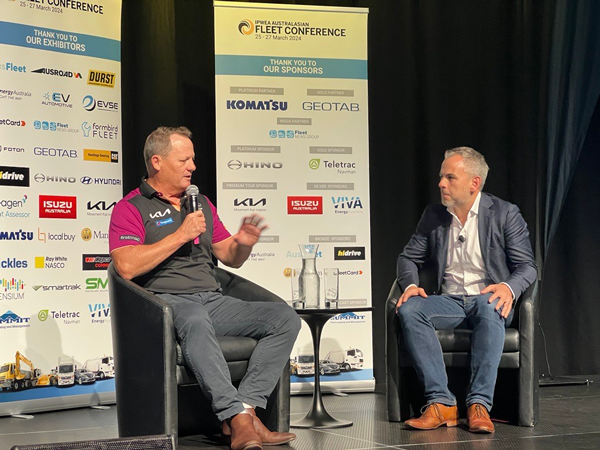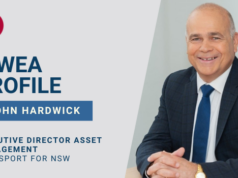A few years ago the Brisbane Broncos NRL team was struggling for wins, and coach Kevin Walters was copping advice from all sides.
“We were renovating our house so every morning I’d have to go out and get a coffee, and the guy who used to serve me would just point to the front page of the paper and say ‘you’re in there again my friend,'” said Walters.
“We would just have a laugh about it, but when that happens you have to remove yourself from that space.”
Walters has worked closely with NRL legend Wayne Bennett through his career, and he quoted advice from his former coach and colleague.
“Wayne said ‘if you listen to the critics and what people are saying in the crowd and take their advice you’ll end up sitting with them,’” said Walters.
“That’s great advice, because you’ve got to have great belief in what you are doing.”
The anecdote was one of many the NRL legend, who has represented Australia and won six NRL premierships, shared with the audience at the IPWEA Australasian Fleet Conference held in Brisbane in March.
Interviewed by IPWEA chief executive David Jenkins, who also played representative rugby in his native UK, Walters offered many insights from his sporting career which were equally applicable to the professional and personal lives of his audience.
Another of his points was around culture, and how organisations need the right people because the group is greater than the individual.
This was the case today more than in the past, with modern teams full of more coaches and support staff all working together for group success.
“When I first came to the Broncos I felt that there were people, among the players and staff, who were more fitted than others to the Broncos culture,” he said.
“Our club is different to Manly, different to the Storm and different to all the others in many ways so I felt I had the right DNA to come back to the Broncos and know the right people we needed.
“So we moved some players and staff on for different reasons.”
While rugby league was an intensely physical game, the difference between winning and losing was often psychological, he said.
“Every team has got the talent and every team trains hard, and game plans are often the same,” said Walters.
“So there’s this little mechanism up here in your head which is most important, and if you can understand that, well I believe that is the key to success.
“And you can train as hard as you like, but you need to be ‘on’ on game day.”
Describing himself as a “glass half full person,” Walters said that it was important to believe that the best was always in front of you. If you stopped believing that, then it was time to quit.
He quoted the example of his great friend and colleague Cameron Smith, who retired from State of Origin NRL after his 42nd and perhaps best game for Queensland.
“We won the game and the series and then Cameron never played for Queensland again,” said Walters.
“He felt he couldn’t get any better which was disappointing but I understand that now.
“That’s been a great mental tool for me and a reminder that your best football is still always in front of you, and if you don’t believe that then you should give it away.”
David Jenkins asked a question about the disappointment of losing the 2023 NRL Grand Final to Penrith.
How could he get his players to rebound from that?
“It’s not nice and it can be horrible, but take away that final experience and look at the good things that come from the game,” he said.
“At the end of the day, you have to experience that to understand what is required to win a premiership.”
Recently, Walters said he had sat the team down and re-watched last year’s final, “picking out the good things and the bad things, and the things we need to work on.”
“The two big items that came out of it, and one was the belief and when we stopped playing as a group,” he said.
“Second was our unforced errors, and we had too many of those. I think we had 10 or 12 for the game and Penrith had only one.
“So they were our takeaways, and we’re working on that.”
Reflecting on the disappointment of 2023, Walters used a baking analogy.
“I felt last year that we had the right mix and the right ingredients to make a nice cake, and while we had a nice cake baked at the end of last year but we didn’t quite put the icing on it,” he said.
“So we are always baking, and we have the belief that we can put that icing on soon.”














